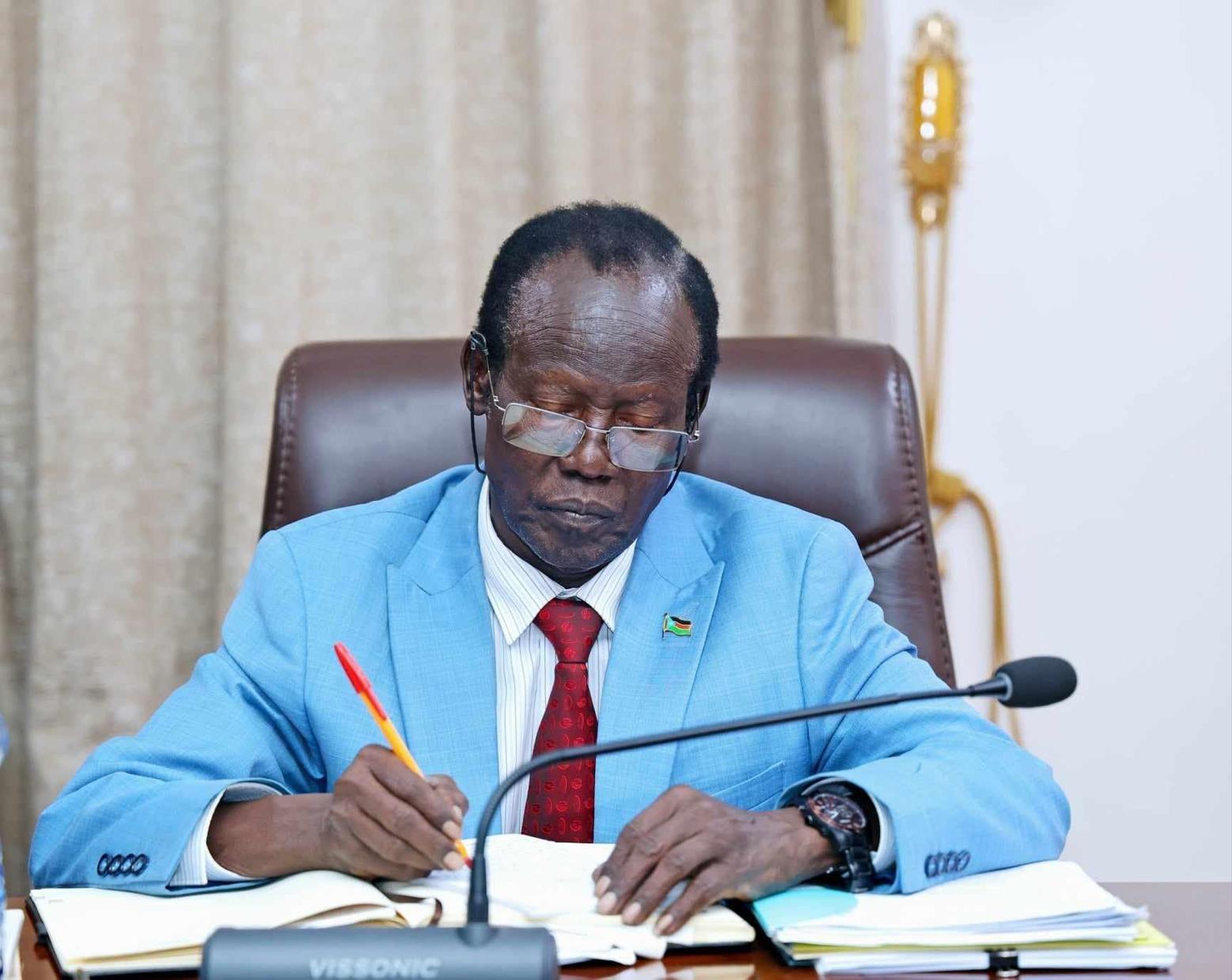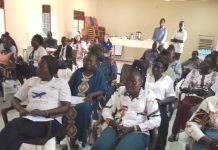John Akoon
Africa-Press – South-Sudan. The Vice President of Economic Clusters, Dr James Wani Igga. [Photo: PPU]
President Salva Kiir chaired an economic revival meeting on Monday that yielded familiar resolutions for addressing the runaway cost of living characterised by inflation.
The meeting was attended by the chair of economic clusters, Dr. James Wani Igga, minister of Finance and Planning, Dr. Barnaba Bak Chol, minister of Petroleum, Puot Kang Chol, Governor of the Central Bank, Dr. James Alic Garang, and other ministers under the economic clusters.
According to the Presidential Press Unit, the leaders resolved to “increase in non-oil revenue collections, supply of enough food into the markets at subsidised prices, supply of enough fuel to the country, allocate enough money into agriculture, auction of a sizable amount of hard currency to stabilise the exchange rate, ban the selling of dollars, banning of illegal checkpoints directed the security forces.”
It attracted the applause of an economist, Dr. Abraham Matoch, the vice chancellor at Dr. John Garang Memorial of Science and Technology, who argued that the action points, if undertaken, would boost the economy.
Matoch said the government needs the collaboration of members of the public, particularly in implementing the ban on the sale of US dollars in the black market.
“A dollar should not be sold in any circumstance by an individual who does not have a license. So, we, the public, are the problem; we can sell other commodities but not dollars. We need to comply with what the Central Bank says, then we take the legal procedures on how to sell things,” Matoch argued.
He added, “If you are licenced, you will pay the licence fees, and also pay taxes to the government. But if we do it in the black Market, we would not be paying taxes.”
Familiar resolutions
But the Monday meeting was not the first time the government made tough measures to address the crisis.
In the 5th Governors’ Forum held between November 22-29, 2021, resolutions were made under theEconomic Reform Policy, where the Ministry of Finance and Planning and the Bank of South Sudan were directed to accelerate reforms in public financial management, mobilise the resources for state development, and allocate funds to revive defunct schemes in the country.
They were also to “establish agro-mechanical services centres across the country to support the expansion of agricultural production and productivity and to enhance food security.”
Last year, the country held the 7th Governors’ Forum, which ended on December 3, 2023, with calls for the implementation of the previous governors’ forum resolutions and recommendations. Some of them included the removal of checkpoints to do away with illegal levies on goods and services, leading to higher market prices.
In the National Economic Conference held last year, the economic clusters were also directed to stabilise market prices through various fiscal policies. Some of them included the harmonisation of taxes, the removal of checkpoints, the removal of the black market that contributes to instability in foreign exchange rates, and much more.
It was also at this conference that the Ministry of Agriculture tabled a strong case for more allocation of budget for agriculture to help the sector grow and resultantly boost the non-oil revenue.
Besides this, the Bank of South Sudan recently announced a crackdown on unlicensed forex dealers operating in the black market, calling on them to formally register.
But in the face of these resolutions, the prices in the markets have remained higher, with traders pointing fingers at multiple taxes, checkpoint levies and the depreciation of the local currency against the US dollar.
Speaking to The City Review, Mr Akol Tong, a Master’s Degree holder in Economics from the University of Juba, said go beyond these resolutions and come up with austerity measures.
He said there is a need for the government to reduce foreign trips, prioritise the construction of refineries, and broaden the economy through tourism sectors.
“I read the items or minutes of the economic cluster meeting. They have good points but for the government to deal with these, they should first lower the running expenses of the government. For example, starting with the presidencies,” he said.
“They need to reduce the delegations that accompanied them on all trips and limit the number of cars given to executives.”
“Prioritizing the construction of refineries and their operationalization is important. Revenues will be generated, and high transportation costs will be reduced by lowering fuel costs. The cost of moving about and moving products has increased, which drives up the price of goods and services,” he added.
Source: The City Review South Sudan
For More News And Analysis About South-Sudan Follow Africa-Press






